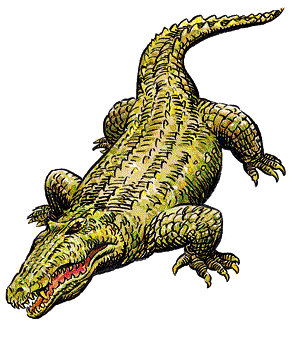
| Normal | Giant | |
|---|---|---|
| Climate/Terrain: | Subtropical and tropical/ Saltwater swamps and rivers | Subtropical and tropical/ Saltwater swamps and rivers |
| Frequency: | Common | Very rare to common |
| Organization: | None | None |
| Activity Cycle: | Day | Day |
| Diet: | Carnivore | Carnivore |
| Intelligence: | Animal (1) | Animal (1) |
| Treasure: | Nil | Nil |
| Alignment: | Neutral | Neutral |
| No. Appearing: | 3-24 | 1 to 2-12 |
| Armor Class: | 5 | 4 |
| Movement: | 6, Sw 12 | 6, Sw 12 |
| Hit Dice: | 3 | 7 |
| THAC0: | 17 | 13 |
| No. of Attacks: | 2 | 2 |
| Damage/Attack: | 2-8/1-12 | 3-18/2-20 |
| Special Attacks: | Surprise | Surprise |
| Special Defenses: | Nil | Nil |
| Magic Resistance: | Nil | Nil |
| Size: | L (8-15' long) | H (21-30' long) |
| Morale: | Average (9) | Steady (11) |
| XP Value: | 65 | 1,400 |
The crocodile is a large, dangerous predatory reptile native to tropical and subtropical climes. It spends most of its time submerged in swamps, rivers, or other large bodies of water.
The crocodile is one of the most feared and ugliest predators of the tropics. It has a long, squat body, ranging in size from a scant foot to well over ten feet long. Most mature specimens range from eight to 15 feet long, and some even larger. Many sages argue that crocodiles never stop growing. The crocodile has a long jaw filled with sharp, conical teeth. The powerful maw is superbly adapted for dragging prey beneath the water and dismembering it. Its four short legs are very powerful, and can propel the crocodile rapidly through the water and over the land. Its long tail is also very strong and is sometimes used on land to unbalance its foes.
The crocodile is covered with a tough horny hide, which blends in very well with the surrounding water. Its eyes and nose are placed so that when the crocodile floats, only they remain above water, enabling the beast to spot and ambush prey. The crocodile is adept at floating through the water and remaining quite still, presenting the illusion that it is nothing more than a floating log.
Combat: Ever voracious, hungry crocodiles will attack anything that looks edible, including men. They prefer to lie in wait for their prey (-2 penalty to opponent's surprise roll), and are exceedingly sensitive to movements in the water. They have been known to swiftly and silently swim up to the shore and seize a man, dragging him below the surface of the water. They prefer to attack with their powerful jaws, causing 2d4 points of damage, and lash with their tails for 1d12 points of damage. Crocodiles will fight among themselves for any prey they seize in their jaws, sometimes tearing their victim to pieces. The only thing that can slow a crocodile is cold. They become slow and sluggish (reduced to 50% of their normal movement) when the temperature falls below 40� F.
Habitat/Society: Crocodiles sometimes congregate in large numbers, but they are not by nature sociable, nor do they cooperate in hunting. They have well-concealed lairs and will often drag their prey to their lairs before eating it. When a tasty morsel comes its way, a group of crocodiles will go into a feeding frenzy, each attempting to get a part of the feast. They hunt almost daily, primarily in the water, rarely on land. Their tastes are broad: fish, men, small mammals, aquatic birds, and even a careless lion has occasionally been known to fall into their grasp. Hungry crocodiles will sometimes upend boats to see what falls out.
Crocodiles mate once a year, and the female lays a clutch of about 60 eggs, carefully burying them in the sand. Unlike many other reptiles, the female carefully guards her eggs, protecting them from other predators. When the time comes for the eggs to hatch, the mother assists by digging the eggs out of the sand. The newly hatched young are thrown entirely on their own resources to survive. Very few of the young survive to maturity.
Swamps and rivers are not the only abode of the crocodile. In recent years there have been dreadful rumors that some of these reptiles have made their homes in the sewers of cities in tropical regions, living on waste and carrion.
Ecology: The crocodile is a formidable predator and has little competition for food from other water creatures. One of the few monsters that can compete with it is the dragon turtle. Even on the riverbanks it has little to fear from rival predators; most would prefer not to tangle with a crocodile. The only predator that the crocodile need fear is man, who hunts it for its tough hide, which can be transformed into a beautiful, gleaming leather. Crocodiles are also hunted to eliminate the danger that they represent to riverside communities.
Giant Crocodile
These creatures are far rarer than their smaller cousins. They attain sizes from 21 to 30 feet long, and they also continue to grow until death. Giant crocodiles typically inhabit salt water or prehistoric settings, where they have been know to prey upon sharks, small whales, and small seagoing crafts, such as fishing boats. When attacking a small boat, their favorite technique is to ram it, attempting to capsize and smash it open with their huge jaws. They have been known to gorge upon the catch within the fishing boats, and then to swim away, leaving the fishermen unharmed.
